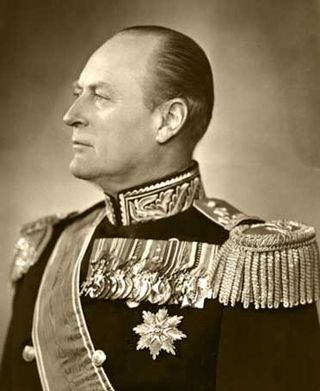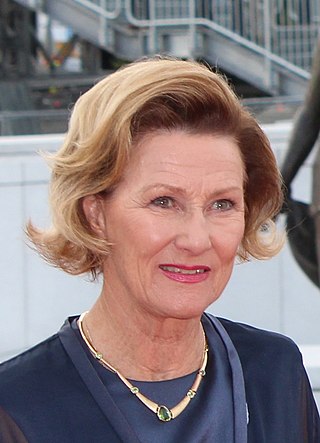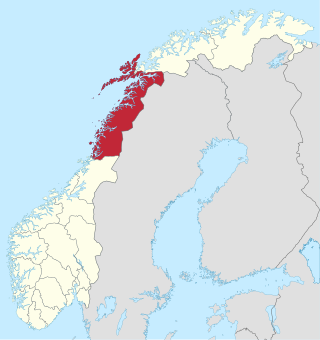
Olav V was King of Norway from 1957 until his death in 1991.

Harald V is King of Norway. He succeeded to the throne on 17 January 1991.

Haakon, Crown Prince of Norway is the heir apparent to the Norwegian throne. He is the only son of King Harald V and Queen Sonja.

Sonja has been Queen of Norway since 17 January 1991 as the wife of King Harald V.
Ságat is a Sámi newspaper written in Norwegian that is published in Leavdnja, Finnmark, Norway.

Knut Magne Haugland, DSO, MM, was a resistance fighter and noted explorer from Norway, who accompanied Thor Heyerdahl on his famous 1947 Kon-Tiki expedition.
The Maudheim medal (Maudheimmedaljen) was instituted by King Haakon VII of Norway on 14 November 1951 in honor of the members of the Norwegian-British-Swedish Antarctic Expedition of 1949–1952, awarded to the participants of the expedition. This expedition was the first to Antarctica involving an international team of scientists. During the expedition, a base known as Maudheim was established on the Quar Ice Shelf along the coast of Queen Maud Land in February 1950. The medal itself is the same as the King's Medal of Merit in Silver with the addition of a silver buckle on the ribbon with the inscription "MAUDHEIM 1949-1952". Only 18 people were awarded with the Maudheim Medal.

The War Medal is a Norwegian war decoration for service during Second World War, and later for meritous service during war.
Events in the year 1872 in Norway.
The Royal Norwegian Society of Sciences and Letters is a Norwegian learned society based in Trondheim. It was founded in 1760 and is Norway's oldest scientific and scholarly institution. The society's Protector is King Harald V of Norway. Its membership consists of no more than 435 members elected for life among the country's most prominent scholars and scientists.

Det Norske Teatret is a theatre in Oslo. The theatre was founded in 1912, after an initiative from Hulda Garborg and Edvard Drabløs. It opened in 1913, touring with two plays, Ervingen by Ivar Aasen and Rationelt Fjøsstell by Hulda Garborg. Its first official performance was Ludvig Holberg's comedy Jeppe på berget, with Haakon VII of Norway and the prime minister of Norway among the spectators. Hulda Garborg was the first board manager, and Rasmus Rasmussen was the first theatre director. The theatre primarily performs plays written in or translated into Nynorsk.
The sixth Norwegian Antarctic Expedition was a scientific expedition to Queen Maud's Land in Antarctica. The expedition was based at Norway Station which was located on the Fimbul Ice Shelf bordering the coast of Queen Maud Land.

Haakon VII 70th Anniversary Medal is a Norwegian military award, which was instituted by King Haakon VII of Norway on 27 October 1942. It was awarded in recognition of military personnel who served in the Norwegian armed forces in Britain on the 70th birthday of Norwegian King Haakon VII. The medal ranks 33rd in the Norwegian decoration order of precedence.
Sigurd Gunnarson Helle was a Norwegian topographer and explorer. He lead the Sixth Norwegian Antarctic Expedition 1956–1960.

H.M. The King’s Commemorative Medal is a royal decoration of Norway. Established in 1906 by King Haakon VII, the medal is awarded to individuals for particularly meritorious service to the King. The medal is awarded in grades, gold and silver. The gold medal ranks 28th in the Norwegian order of wear just below the Antarctic Medal and above The Royal House Centenary Medal. The silver medal ranks 38th in the order of precedence below the King Olav V's 100th Anniversary Medal and above the Defence Service Medal.
The King Haakon VII 1905–1955 Jubilee Medal, also known as the King's Jubilee Medal, is a Norwegian award instituted in November 1955 by Haakon VII of Norway in honor of the 50th anniversary of his accession to the throne. The medal ranks 32nd in the Norwegian decoration order of precedence.
The King Haakon VII Commemorative Medal of October 1, 1957 is a Norwegian award created to commemorate the deceased monarch on the occasion of his funeral. King Haakon's funeral took place on October 1, 1957. The medal ranks 30th in the Norwegian decoration order of precedence.

Vest-Agder is one of the 19 multi-member constituencies of the Storting, the national legislature of Norway. The constituency was established in 1921 following the introduction of proportional representation for elections to the Storting. It consists of the municipalities of Åseral, Farsund, Flekkefjord, Hægebostad, Kristiansand, Kvinesdal, Lindesnes, Lyngdal, Sirdal and Vennesla in the county of Agder. The constituency currently elects five of the 169 members of the Storting using the open party-list proportional representation electoral system. At the 2021 parliamentary election it had 137,466 registered electors.

Nordland is one of the 19 multi-member constituencies of the Storting, the national legislature of Norway. The constituency was established in 1921 following the introduction of proportional representation for elections to the Storting. It is conterminous with the county of Nordland. The constituency currently elects eight of the 169 members of the Storting using the open party-list proportional representation electoral system. At the 2021 parliamentary election it had 182,075 registered electors.









